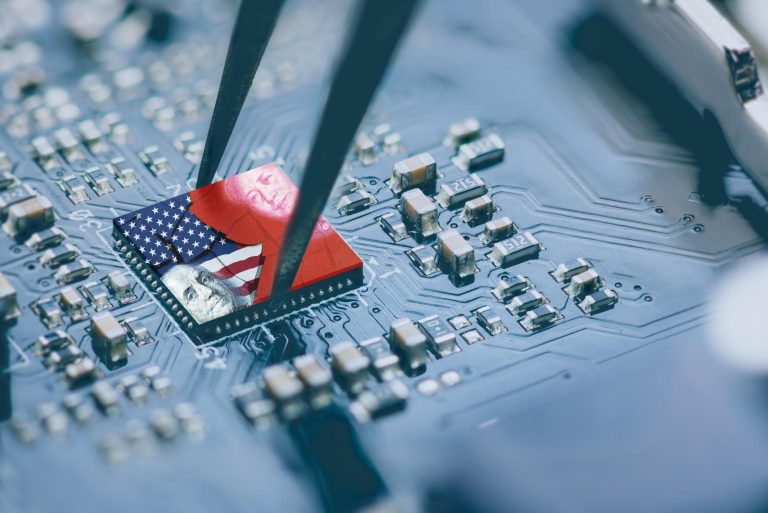By Wen Long
On Oct. 17, the United States issued new export control regulations, requiring companies to obtain permits before exporting controlled chips or equipment to any country or company subject to U.S. arms embargo restrictions. The scope of control has also expanded to include at least 15 categories of semiconductor manufacturing equipment, and these new regulations will take effect 30 days after their release.
The Biden administration had previously notified Beijing in early October of its plans to update the restrictions on exporting artificial intelligence (AI) chips and chip manufacturing equipment to China. The United States had already restricted the export of AI chips to the Middle East to prevent those countries from reselling them to China and Russia.
US updates export restrictions on AI chips
The U.S. Department of Commerce, responsible for overseeing export controls, had been studying the initial export restrictions issued last year. This update aims to limit the use of more chip manufacturing equipment in accordance with new regulations from the Netherlands and Japan and address some of the loopholes in the current restrictions on exporting AI chips.
Before these measures were updated, the Biden administration had dispatched a series of senior officials to visit mainland China, including Secretary of Commerce Gina Raimondo in August and National Security Advisor Jake Sullivan in September. These measures, initially introduced last October, aimed to cut off Beijing’s access to advanced AI chips and restrict Beijing’s ability to import the most advanced chip manufacturing equipment from the United States to prevent American technology from enhancing Communist China’s military capabilities.
Success
You are now signed up for our newsletter
Success
Check your email to complete sign up
In July, US Treasury Secretary Janet Yellen also issued a warning to Chinese officials about investment restrictions in the United States. The Biden administration is also hoping that Chinese leader Xi Jinping will attend the Asia-Pacific Economic Cooperation (APEC) summit in San Francisco in November. However, the newly released rules may influence Xi’s decision to attend.
The United States, the Netherlands, and Japan, which jointly control the world’s top chip manufacturing equipment, had agreed to coordinate earlier this year. The new U.S. regulations may impact ASML, the world’s leading chip equipment manufacturer based in the Netherlands, as its systems contain U.S. components.
Nvidia and AMD face further restrictions
American chip manufacturers Nvidia and AMD were also previously informed by the U.S. government of restrictions on exporting advanced AI chips to the Middle East.
Nvidia submitted a document to regulatory authorities in early September, disclosing new export control requirements, stating that, “In the second quarter of the 2024 fiscal year, (Washington) notified us of additional licensing requirements for A100 and H100 products shipped to certain customers and regions (including some Middle Eastern countries).” Similar notifications were received by AMD. Both companies have stated that while the new control measures will affect some product exports, they will not have a significant impact on their performance.
The previous restrictions included a limit on the transfer rate of advanced chips, and the new regulations add a new “Performance Density” (PD) threshold limit. Analysts believe the main purpose of the regulations is to prevent China and Russia from purchasing restricted chips from Middle Eastern partners.
Escalating tech war
The technological tensions between China and the United States are believed to have undergone a significant escalation. Without American chips from companies like Nvidia and AMD, Chinese institutions will be unable to efficiently conduct fast calculations for numerous tasks, including image, video, and voice recognition.
Political commentator Ulunxiang believes that Washington’s new regulations could prove decisive because high-performance image recognition plays a crucial role in the “deep learning” process of AI systems. Currently, Nvidia’s chips hold a global market share of over 70 percent, and even products from Intel or Google would be hard-pressed to replace them.
The Beijing authorities extensively use artificial intelligence in areas such as mass censorship and surveillance. The “Made in China 2025” and the “13th Five-Year Plan” emphasize artificial intelligence to an unprecedented degree, emphasizing its significant help to the government in understanding and controlling society.
Congress presses White House for stronger sanctions
U.S. Congressman Mike Gallagher, chairman of the House Select Committee on the CCP, and Democratic Congressman Raja Krishnamoorthi, a senior member of the committee, previously wrote to Secretary of Commerce Gina Raimondo urging the United States to further strengthen export controls on China to cut off the channels for the CCP to obtain high-end AI chips produced by companies like Nvidia, AMD, and Intel.
Previous U.S. export control regulations prohibited the export of advanced chips and chip manufacturing equipment to Chinese chip manufacturers, and chips with transfer rates exceeding 600GB per second were not allowed to be exported to mainland China.
To meet these control requirements, Nvidia quickly tailored its A800 chip for the Chinese market, capping data transfer rates at 400GB per second, replacing the company’s higher-end A100 chip, which had a transfer rate of up to 600GB per second. Nvidia stated that the A800 meets the technical requirements for developing AI systems.
Other U.S. chip companies are also hoping for opportunities in the Chinese market’s computer, server, and 5G communication industries, and they are following Nvidia’s example in customizing chips for the Chinese market that conform with Washington’s restrictions.













